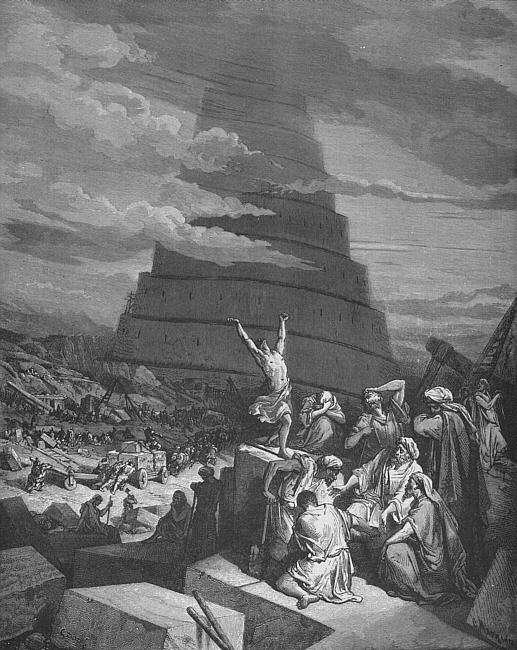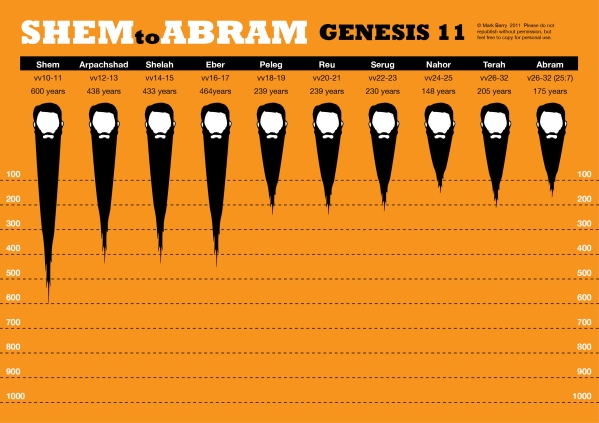 This iconic chapter is one that many people, even those who do not read the Bible, would probably be able to tell you about. However, the story of the Tower of Babel is only a small part of this chapter. It is a brief story inserted between genealogies. In the previous chapter, we saw how Noah’s sons began to spread out across the Earth, establishing families in differing regions. I must confess that this story puzzles me, mainly because there are so few details which I key in on and really focus on to understand exactly what is happening. This seems more like Genesis 1 than Genesis 2 in that Genesis 2 seems to focus on the details while Genesis 1 paints a broad overview of what God is doing. This is a lot like that. While I do not deny that Genesis 1 or Genesis 11 actually happened, I think the broad nature of the way they are told imply that the significance is not in the details, but in what is actually said.
This iconic chapter is one that many people, even those who do not read the Bible, would probably be able to tell you about. However, the story of the Tower of Babel is only a small part of this chapter. It is a brief story inserted between genealogies. In the previous chapter, we saw how Noah’s sons began to spread out across the Earth, establishing families in differing regions. I must confess that this story puzzles me, mainly because there are so few details which I key in on and really focus on to understand exactly what is happening. This seems more like Genesis 1 than Genesis 2 in that Genesis 2 seems to focus on the details while Genesis 1 paints a broad overview of what God is doing. This is a lot like that. While I do not deny that Genesis 1 or Genesis 11 actually happened, I think the broad nature of the way they are told imply that the significance is not in the details, but in what is actually said.
The Bible tells us that the whole Earth is speaking the same language, which seems to make sense since they all descend from the same family of three brothers. What is interesting is that the language doesn’t break down due to the broad geographic regions of their settling. Imagine traveling back to 16th century England and trying to understand the people there. You would both be speaking the same language and would understand much of what the other said, but many words would be completely foreign, enough of them that speech would be difficult. The exact date of the confusing of language is not something that is available to us, but many of the people in the generations after Noah seem to be living quite long lifespans. Given enough time and isolation, language can evolve quite dramatically. I say all of this to point out that the whole world speaking one language seems pretty significant as it could indicate that their level of technology and means of communication might have been fairly sophisticated. Perhaps this is why God says in verse 6 that “nothing they propose to do will be withheld from them.” In the age we live in today, as scientifically advanced as we are, there are many things that seem just out of our reach.
This brings me to a subject that I’m drawing from the text, but not necessarily out of it, if that makes any sense, and that subject is the idea of progress. In today’s society, but most pointedly in American culture, the idea of progress has been the driving force behind all we do. From the Declaration to Manifest Destiny to Emancipation to Suffrage to Marriage Equality, the idea of progress is what drove all of these major changes. I am not going to attack progress in itself, because progress is not something evil and is indeed something God is actively working toward, however, “progress for progress’ sake” is something that seems to be steering us toward a Babel like society. What I mean by this is that many today believe that science and technology will be able to alleviate all of our problems, “if only those backwoods Christians will stay out of our way”. They dream of a future where man is immortal, needing no body, but living forever in some horrific fusion of man and machine. They see a time coming when we will have conquered nature, and in many ways, this is already coming true. We will eradicate ourselves of all disease, but also be able to one day steer hurricanes, produce children without a father, and genetically alter our DNA to be whatever we want to be. This kind of thinking is exactly what I believe was going on in Genesis 11. While I will not say they had even close to our technology, the idea remains the same: man intended to supplant God from His throne and replace himself as the only authority. Progress can do many wonderful things, but there is a thin line that must be carefully traversed in order to keep our perspective, with God directing the progress.
Man says, “Let us build ourselves a city, and a tower whose top is in the heavens; let us make a name for ourselves.” If you have not become convinced of any wrongdoing before verse 4, this quote alone should bring things into perspective. This is not a spiteful God who feels threatened by man who He is losing control over as they become too powerful. This is a God who gave man everything man has and they seek to supplant Him. Look at the language. “Let us”…seem familiar? The idea that this tower would reach to heaven is not literal, but figurative. This tower would reach to a new heaven with man as the God who ruled. They do this “lest they be scattered abroad over the face of the whole earth.”
Next, the Lord comes down to see the city and the tower which they had built. This is an anthropomorphism. In future blogs, we will reach anthropopathisms. Anthropomorphism is the attribution of physical human properties to something other than man, like an animal, inanimate object, or in this case, God. God is not literally unaware of the tower and city until he “came down to see” them. This is a literary device the writer is using to allow us to understand something about God which we would not normally be able to comprehend. Giving God eyes and physical space he occupies is not a theological treatise, but merely helps us understand a God who is made of spirit and is omnipresent and omniscient. God was aware this tower would be built well before the creation of the world. But in order for this story to be a story, certain elements are expected, including God being made aware of the existence of the tower and city.
God then proceeds to pass his judgment. He says, “Come, let Us go down and there confuse their language, that they may not understand one another’s speech.” When God says “Let Us…” worlds can be created and worlds can be destroyed. In this instance, the world man had built for himself without God would soon be destroyed. Remember that at this point they ought to be filling the world, not settling in one spot. This was done in direct violation of God’s command. God, therefore, confuses their language and forces them to be scattered across the world. The Bible mentions that this is why it was called Babel, which comes from a Hebrew word meaning “to confuse”. Interestingly, I could not find an etymological connection to the English word “babble”, but I did find one in connection with Babylon, which would later become the enemies of God’s people and be used as the instruments of God’s judgment.
In the second part of this chapter, we reach the genealogies. I must be honest that my highlights pretty much disappear altogether here, but what is important to me, at least, is the link between Abram and Shem being firmly established. Terah was Abram’s father, while Nahor and Haran are his brothers. We learn that Abram and Nahor both had wives, Sarai and Milcah respectively. We also learn that Sarai was barren and had no children. Lastly, we learn the Terah takes his son Abram, his grandson Lot (son of Haran), and Sarai from the land of Ur (a populous city in Mesopotamia) to the land of Canaan in the land of Haran. Abram’s father dies in Haran at the age of 205.
Though we know the family history of Abram, we have to ask ourselves at this point, why is he even being discussed? While indeed he is descended from Shem, there are many others who are his descendants as well, but for some reason we are reading about Abram and not them. The reason for God’s choice of Abram and the blessings He would confer upon him are unknown, but it is important to note that God is actively working in history according to His purposes, continuously pursuing the same goal that man thrive on the Earth and bring glory to his Creator. Below is an image showing the genealogy from Shem to Abram which indicates their ages by beard length, which I found especially amusing:
